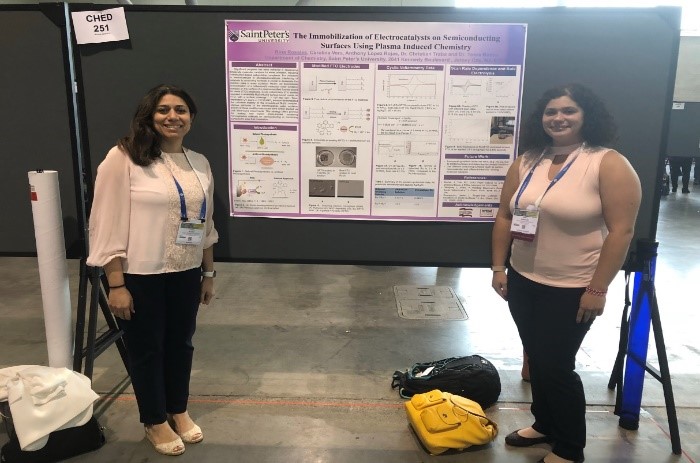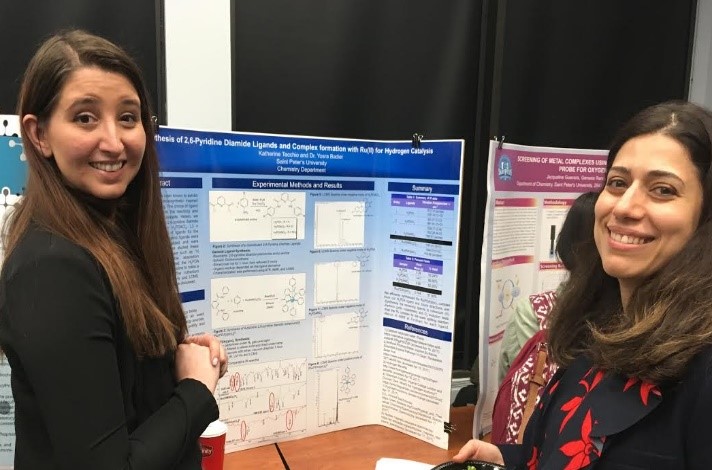Student & Faculty Research
Selected Student Oral and Poster Presentations
Jessica Epstein, Zanib Mian, Stephanie Rosales, Applying splitting patterns to prove a reaction mechanism (poster), presented remotely through SciMeetings due to COVID-19. March 2020, ACS 259th National Meeting,
Rina Rosales, Yosra M. Badiei, Christian, Traba, Carolina Vera, Plasma modified electrodes as a platform for immobilizing water-splitting catalysts (oral presentation). August 2018, ACS 255th Fall National Meeting, Boston, MA
Rina Rosales, Christian Traba, Yosra M. Badiei, The Immobilization of Electrocatalysts on Semiconducting Surfaces Using Plasma Chemistry (poster). 2018 ICFNJ Undergraduate Research Symposium, Liberty Science Center, NJ
Jacqueline Guevara, Yosra M. Badiei, Identification of oxygen evolution complexes using a dissolved oxygen optical probe (oral presentation). 2017 ACS 254th Fall National Meeting, Washington DC
Castillo, Chelsea. Yosra M. Badiei, “Surface Attachment of a Ru-Molecular Complex to Plasma Grafted FTO (poster). 2017 ACS 254th Fall National Meeting, Washington DC
Tawanda Aquino, Kristian Gutierrez, Matthew Hankins, Yosra. M Badiei, Artificial photosynthesis: Water Splitting for Solar Fuels (poster). 2016 ICFNJ Undergraduate Research Symposium, Liberty Science Center, NJ
Kral, J., McCormick, C., Castaldi, M., Epstein, J. Exploring Polymers Through Experiments in the Undergraduate Laboratory (poster). June 11th 2016, ACS MARM, Riverdale, NY
Tawanda Aquino, Krystal Velez, Yosra M. Badiei, “Artificial photosynthesis: Water Splitting for Solar Fuels (oral presentation). 2015 Fifth Annual Title V Oscar Romero Project Research Festival, SPU, NJ
Jessica Epstein, Peter Telidecki, Angel Munoz, Justin Johnson, Thao Ngo, Grishma Patel, Briana Williams, Christian Traba, Michael J. Castaldi. Student prepared videos to document department instrumentation and laboratory operations and procedures. August 2014, ACS 248th Fall National Meeting & Exposition, San Francisco, CA
Grishma Patel, Michael J. Castaldi, Jessica Epstein, Peter Telidecki, Thao Ngo, Christian Traba, Patricia Redden, Science and synthesis of artificial scents and flavors (poster). August 2014, ACS 248th Fall Meeting San Francisco, CA.
Michael J. Castaldi, Jessica Epstein, Joseph Brauner, Justin Johnson, Briana Williams, Enhui Chen, Control of one vs. two alkylation of 5-amino tetrazoles and the effect of different protecting groups (poster). March 2014, ACS 247th National Meeting & Exposition, Dallas, TX
-

Presentation at Academic Symposium, April 2019, Jersey City, NJ
Left to right: Zanib Mian, Stephanie Rosales, Dr. Jessica Epstein
-

Presentation at the ACS 255th Fall National Meeting, August 2018, Boston, MA
Rina Rosales (right) and Dr. Yosra Badiei (left)
-

Presentation at the Academia Symposium, April 2017, Jersey City, NJ
Katherine Tecchio (left) and Dr. Yosra Badiei (right)
SURGE Fellows
STEM Undergraduate Retention Graduation and Empowerment (SURGE) fellows are students who receive a one-year paid stipend to do research with a faculty member. Many of these research experiences result in a peer-reviewed publication.
Jamie Mosquera, 2020-2021, with Dr. Jessica Epstein
Jacqueline Guevara, 2016-2017, with Dr. Yosra Badiei
Genesis Renderos, 2016-2017, with Yosra Badiei
Rina Rosales, 2018-2019, with Dr. Yosra Badiei
Evelyn Ortiz, 2018-2019, with Dr. Yosra Badiei
Alejandro Gomez Gonzalez, 2020-2021, with Dr. Yosra Badiei
Claudio Amaya, 2010-2020, 2020-2021, with Dr. Yosra Badiei and Dr. Wanlu Li
Diego Chavez, 2017-2018, with Dr. Daniel Fried
Azuri Hughes, 2018-2019, with Dr. Daniel Fried
Jada Mathews, 2020-2021, with Dr. Wanlu Li
Muhammad Moueed Haider Mirza, 2020-2021, with Dr. Wanlu Li
Adam Daoud, 2020-2021, with Dr. Wanlu Li
Faculty Research
Jessica Epstein, Professor
Research Interests
I am particularly interested in designing new teaching experiments for the Organic Chemistry laboratory. I take ideas from past and present research projects and think about ways to make them both a research and a teaching opportunity. I am currently working on two projects. The first involves studies on biodegradable polymers and alternative methods for plastic recycling. The second project is about key molecules or measurement techniques that have shaped the history of chemistry and science.
Yosra Badiei, Associate Professor
Research Interests
Solar-to-fuel conversion, water-oxidation catalysis, mechanism of oxygen evolution reactions, surface modification, hetergoenized molecular catalysts, inorganic and organic synthesis, coordination chemistry, and hydrocarbon activation.
Solar-to-chemical energy conversion, also known by artificial photosynthesis, can lead to the storage of solar energy in the form of chemical bonds such as hydrogen from water and produce new biomass C1 building blocks (for e.g. methane, methanol) from CO2 to help in fuel growth and recycling of CO2 emission. This is a highly promising strategy for the development of clean and sustainable fuel technologies. Progress in this field, however, will heavily rely on the use of catalysts made of cheap materials and earth-abundant metals to make it an economically viable energy resource.
My research focuses on the design and synthesis of new molecular catalysts for water-splitting, and the investigation of the details of catalytic mechanisms by exploring the structure, spectroscopy, and kinetics of the intermediates. Emphasis is placed on exploring new earth-abundant transition metal-complexes that can replace the widely known expensive noble metal catalysts.
Daniel Fried, Assistant Professor
Research Interests
I am interested in protein structure and folding. During my Ph.D. I helped design a new method for sensing the folded state of a protein using specific fluorescent dyes. I am currently working with fluorescent proteins from marine organisms including fish and invertebrates that could have biomedical applications. I also work extensively in chemistry curriculum design. I am interested in creating digital and in-school learning environments that allow very young students to begin an early study of chemistry and biochemistry. I have had several students work with me in local schools and they have coauthored publications with me on science education.
Wanlu Li, Assistant Professor
Research Interests
I am interested in innovating new materials for applications in environmental chemistry. These materials are applied in pollutions absorption or conversion, energy conversion, and storage, overall, for sustainable development. The research spans the disciplines of chemistry, materials science, and chemical engineering. I am currently working on three projects. The first project is about waste pharmaceutical adsorption for water treatment. The second project is about developing metal-free antibacterial materials. The third project is to convert solid waste into useful materials for energy conversion and storage applications.
